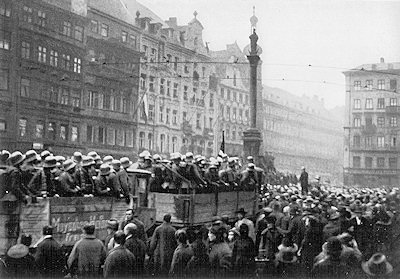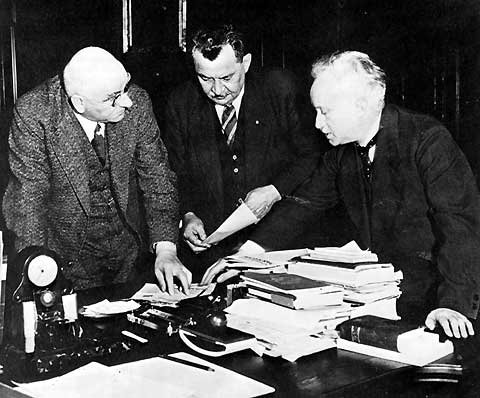Chapter II: The Second Putsch
Once Hindenburg announced his intention to nominate Otto Wels as Reichskanzler, the leader of the SPD promised to form a strong government committed to the people, saying that "only those forces that fully accept the democratic principles will be able enter the new Cabinet ".
However, the Nazi party was not happy, and despite the protests of some party figures such as Joseph Goebbels, Robert Ley or Richard Walther Darré who proposed a policy of firm but peaceful opposition to regain the first place inthe German politics, Adolf Hitler decided that he should not wait more.
After summoning Ernst Röhm and other SA commanders, Hitler said "the time for action had come," and ignoring those who intended to wait for the Government of Wels to be isolated and weakened as time passed on after the elections, the NSDAP leader chose to call to "a general insurrection against the result of the unfair and manipulated elections".
Adolf Hitler in his speech calling for a general insurrection
However, the police were already warned and many of the highest ranking military saw Hitler as an upstart with too much ambition and no experience, and in most cities the Nazi revolt was quickly suppressed and its local leaders arrested .
The exception was to be found in the ultraconservative Bavaria and in Nuremberg, key city for all NSDAP members. After years of infiltration within the local organizations and police officers, the rebels took control of Munich and Nuremberg in a few hours.
Situation after the first news arrived to Berlin
Seeing that the police was not able to contain the revolt and that there was an urging need for some form and quick action, the new chancellor asked Hindenburg's to allow "a temporary state of emergency" to end this fearsome situation. Without hesitation, Hindenburg agreed to ratify a new document, and under the auspices of the 48th Article of the German Constitution published the "Decree of the Reich President for the Protection of the German Law", allowing the temporary suspension of certain civil liberties and the assumption by the Chancellor of all military command.
The "Decree of the Reich President for the Protection of the German Law"
Without further delay, Wels mobilized the reduced German Army, and after verifying that the High Command was loyal to the Government he ordered the deployment of three divisions to quell the revolt of Nuremberg and redeployed the remaining forces to Munich, where the local garrison was in battle with the mutineers.
The Army arriving to defend Munich from the rebels
Battles were not easy. As much as they understood the need to defend the country from the Nazi enemy, the soldiers had to fight against other Germans, and the need to fight in urban environments turned the struggle even more difficult. This situation did not begin to change until a week later, when the first reinforcements began to arrive and General von Rundstedt managed to coordinate the efforts of all the deployed soldiers finally gained control over Nuremberg.
Still, it was not until 12 days later, on March 25th, when the Government´s troops ended with the last pocket of resistance in the city of Munich and ended the Nazi uprising. Hitler's madness claimed the lives of 6542 dissidents and 960 soldiers.
Results of the Nuremberg and Munich battles
Upon resolution of the crisis, Chancellor Otto Wels kept his word and requested the President to cancel the Presidential Emergency Decree, returning to the democratic system and to the necessary separation of powers. However, the main Nazi party leaders who had participated or encouraged the revolt were arrested for High Treason and would be tried in the coming months. In this situation, Goebbels took command of the party, but he was forced to write a statement of rejection to avoid more arrests within the NSDAP.
The rebellion had failed and the democratic forces had triumphed, but lot of things still needed to be done. The Nazi party was weakened but still was the second political force, and many Germans were sympathetic to Hitler despite his attempted coup. And, on the other hand, the economic situation was the same. The SPD had a long road ahead ...




















